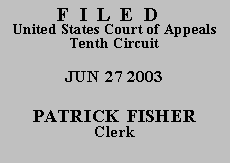

| UNITED STATES OF AMERICA,
v.
LINDA MAYNARD |
No. 02-5169
(D.C. No. 98-CR-21-C) |
I
In January of 1999, Maynard pled guilty to misprision of a felony in violation of 18 U.S.C. § 4, and was sentenced to three years' probation. On March 18, 2002, the United States Probation Office filed a Petition for Revocation of Probation, alleging that Maynard violated the terms of her probation by obstructing a police investigation in violation of Oklahoma law. Specifically, the petition stated that on March 3, 2002, while investigating the murder of Rhoda Chastain, Tulsa police officer Dan Ward went to Maynard's home, looking for suspects Shaila McCully and Robert Dwayne McCully. Maynard told the officers that she "gave the suspects a ride to a convenience store outside of Sapulpa," when in fact she had transported them to her niece's home in Sand Springs, Oklahoma. (1 R. at 339.) Maynard admits that she lied to the police officer regarding the suspects' whereabouts, but insists that she did not know that the suspects were accused of murder at the time she had contact with them. We note, however, it is undisputed that when Maynard was questioned by the police officer, she was told the McCullyes were sought in connection with a murder.
Maynard waived a revocation hearing, stipulating that she violated the terms of her probation. Before sentencing, Maynard filed a "Response to the Probation Officer's Sentencing Memorandum and Petition for Revocation," in which she recounted her flawless probation record and requested a sentence of supervised release for her probation violation; the government likewise recommended that Maynard be sentenced to a term of supervised release. Notwithstanding the government's recommendation, the district court sentenced Maynard to thirty months' imprisonment. Maynard appeals, contending that the district court's sentence was an abuse of discretion because (1) the recommended sentencing range under Chapter 7(1) was six to twelve months; (2) she had nearly completed her three-year term of probation; (3) the government recommended supervised release; and (4) there was no evidence that Maynard knowingly assisted the murder suspects.
II
Sentences imposed after a probation revocation are governed by 18 U.S.C. § 3565. See United States v. Garfinkle, 261 F.3d 1030, 1032 (10th Cir. 2001). Pursuant to § 3565, if a defendant violates a condition of probation, the district court has the authority to revoke the probation and sentence the defendant up to the maximum term available for the underlying federal crime of conviction. § 3565(a)(2). In so doing, the sentencing court must comply with subchapter A of the general sentencing statutes, set forth in 18 U.S.C. §§ 35513559, and consider the sentencing guidelines. Id. In the case at bar, Maynard's state offense of obstructing a police investigation was a Grade C violation. Given her criminal-history category of IV, the recommended sentencing range was six to twelve months' imprisonment under Chapter 7, U.S.S.G. § 7B1.4, but the statutory maximum for the underlying conviction of misprision of a felony is three years. Thus, the thirty-month sentence was within the statutory maximum, but outside the range recommended in Chapter 7.
When a district court imposes a sentence after revocation of probation in excess of that recommended in Chapter 7, "we will not reverse if it can be determined from the record to have been reasoned and reasonable." United States v. Lee, 957 F.2d 770, 774 (10th Cir. 1992). We review the district court's findings of fact for clear error and review de novo its application of the Sentencing Guidelines. United States v. Davis, 151 F.3d 1304, 1308 (10th Cir. 1998).
In sentencing Maynard, the district court complied with its obligations to consider the sentencing guidelines. See Lee, 957 F.2d at 774 ( holding that Chapter 7 recommendations "must be considered by the trial court in its deliberations concerning punishment for violation of conditions of supervised release"). At the same time, the court recognized that it was not bound by the applicable recommendations for sentencing under § 7B1.4. See United States v. Hurst, 78 F.3d 482, 483 (10th Cir. 1996) ("Section 7B1.4 is . . . not a sentencing guideline per se; it is merely a policy statement" (quotation omitted)). Concluding that Maynard "fully understood the consequences of not cooperating and assisting the police," the district court sentenced Maynard to a thirty-month prison term "to reflect the seriousness of the conduct resulting in the revocation of this probation." (4 R. at 7.) In light of the grave significance of obstructing a murder investigation and the fact that Maynard's sentence was less than the three-year statutory maximum for her underlying conviction for misprision of a felony, the district court's sentence was reasoned and reasonable. Accordingly, we AFFIRM.
ENTERED FOR THE COURT
Carlos F. Lucero
Circuit Judge
*. The case is unanimously ordered submitted without oral argument pursuant to Fed. R. App. P. 34(a)(2) and 10th Cir. R. 34.1(G). This order and judgment is not binding precedent, except under the doctrines of law of the case, res judicata, and collateral estoppel. The court generally disfavors the citation of orders and judgments; nevertheless, an order and judgment may be cited under the terms and conditions of 10th Cir. R. 36.3.
1. Chapter 7 of the Guidelines relates to violations of probation and supervised release.